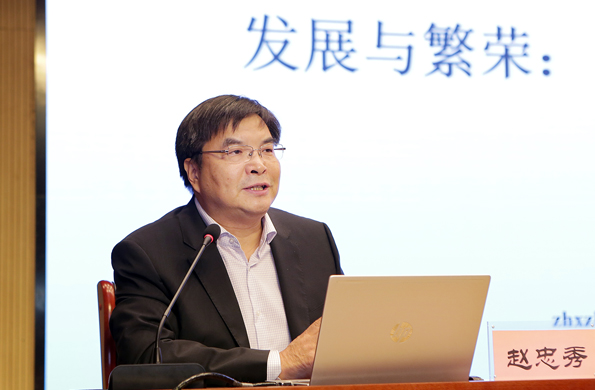CIIE a banner for higher-level openness
 The second China International Import Expo (CIIE), which opened in Shanghai on Nov. 5, injected vitality into a world economy weighed down by trade protectionism and unilateralism. Now that China has been a major buyer in the global marketplace, a more open CIIE with a higher level of exchanges will create more dividends for the world to share.
The second China International Import Expo (CIIE), which opened in Shanghai on Nov. 5, injected vitality into a world economy weighed down by trade protectionism and unilateralism. Now that China has been a major buyer in the global marketplace, a more open CIIE with a higher level of exchanges will create more dividends for the world to share.This year’s CIIE was of an even larger scale than it was last year. Some 3,893 companies from 155 countries and regions took part in the six-day event, concerning trade, service trade, investment, high-quality life and humanities exchange. It also displayed China’s development achievements in the new era as well as the country’s efforts and strength in building an open world economy and promoting economic globalization in a more open, tolerant, inclusive, balanced and reciprocal direction.
Economic globalization is an irreversible historical trend, but there will be various obstacles and even serious setbacks in the development process. Today’s world economy is facing enormous challenges. The narrow values that prioritize self-interest above overall human interest are constantly challenging the global governance system. As anti-globalization surges, protectionism and unilateralism continue to emerge.
At this moment when the world economic ship needs to correct its course, Chinese President Xi Jinping delivered a keynote speech at the opening ceremony of the second CIIE, presenting the prospect of jointly building an open world economy through cooperation, with innovation, and for mutual benefit.
Xi also said that China will continue to open up its market, optimize its opening up structure, improve the business environment, deepen multilateral and bilateral cooperation, and advance Belt and Road (B&R) cooperation.
As a major initiative for China to open its market to the world, the CIIE is not only a functional platform for China to expand imports, but also a window for its institutional construction and policies and a positive force in China’s promotion of an open world economy. Since the first CIIE last year, there have been remarkable achievements, and the multi-faceted opening measures announced at the first CIIE have been essentially implemented.
For example, the China (Shanghai) Pilot Free Trade Zone has been expanded to include the Lingang New Area, facilitating a network of 18 pilot free trade zones. The science and technology innovation board has been established at the Shanghai Stock Exchange and seen good market performance. China’s new foreign investment law and its implementation regulations will come into force on Jan. 1, 2020. These are essential for China’s institutional openness, introducing a new regulatory model of pre-entry national treatment together with a negative list regarding foreign investments.
Based on China’s great achievements of the past seven decades and the experience of more than four decades of reform and opening up, China’s door will only open wider. First, China has a tremendous market. Domestic consumption plays a fundamental role in economic development and also expands space for world economic growth. China will further reduce tariffs and institutional costs, foster a number of innovative demonstration zones promoting imports, and expand imports of high-quality products and services from various countries.
China will accelerate the formation of a new pattern of comprehensive openness and continue to encourage bold innovation in its pilot free trade zones.
China will continue to optimize the business environment, provide institutional guarantees for high-level openness and high-quality development through modernizing the national governance system and governance capacity, and continue to shorten the negative list. In addition, China will focus on protecting intellectual property rights and encouraging innovation.
Moreover, the country will continue to deepen multi- and bilateral cooperation and bring the Regional Comprehensive Economic Partnership into force as soon as possible, promote the negotiation process of several bilateral and multilateral free trade agreements or upgrade existing agreements, and enhance the authority and effectiveness of the multilateral trading system.
In addition, China will continue to facilitate the joint construction of the B&R. Following the concept of being open, green and clean, China will foster the high-quality development of the B&R to make new contributions to the construction of an open world economy and a community of shared future for mankind.
The article was edited and translated from Guangming Daily. Zhao Zhongxiu is president of the Shandong University of Finance and Economics.
edited by CHEN ALONG
